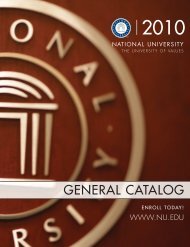Journal of Research in Innovative Teaching - National University
Journal of Research in Innovative Teaching - National University
Journal of Research in Innovative Teaching - National University
Create successful ePaper yourself
Turn your PDF publications into a flip-book with our unique Google optimized e-Paper software.
Evidence for Effectiveness <strong>of</strong> Accelerated Education<br />
The preced<strong>in</strong>g section demonstrates that, on a conceptual level, there are arguments for and<br />
aga<strong>in</strong>st accelerated education. What does the research evidence show Several early reviews<br />
found very difference between compressed, <strong>in</strong>tensive programs and more traditional programs<br />
(Lynch, 1975; Mims, 1985; Powell, 1976). In the most recent comprehensive review, Scott and<br />
Conrad (1992) discussed how the present-day need for accelerated courses and programs<br />
stemmed from several sources (e.g., refresher courses, make-up credits, fast foreign-language<br />
tra<strong>in</strong><strong>in</strong>g), all <strong>of</strong> which were aimed at accelerat<strong>in</strong>g the delivery <strong>of</strong> educational content with little or<br />
no sacrifice to educational quality. The discussion <strong>of</strong> effectiveness here will summarize what is<br />
known by exam<strong>in</strong><strong>in</strong>g five dist<strong>in</strong>ct areas outl<strong>in</strong>e by Scott and Conrad (1992). These areas<br />
represent situations where the learn<strong>in</strong>g process is accelerated <strong>in</strong> an attempt to move students<br />
through their courses and programs faster and more efficiently compared to more traditional<br />
forms <strong>of</strong> college <strong>in</strong>struction (e.g., semester and quarter systems). I will not review the early<br />
studies cited by Scott and Conrad (the <strong>in</strong>terested reader is encouraged to exam<strong>in</strong>e their excellent<br />
monograph); <strong>in</strong>stead, I will focus on more recent evidence (studies done s<strong>in</strong>ce 1992) related to<br />
the effectiveness <strong>of</strong> accelerated programs and learn<strong>in</strong>g.<br />
Summer Sessions<br />
Summer sessions are usually embedded between spr<strong>in</strong>g and fall semesters <strong>in</strong> an attempt to <strong>of</strong>fer<br />
accelerated classes to special groups <strong>of</strong> learners (e.g., teachers <strong>in</strong> need <strong>of</strong> “refresher classes,”<br />
students requir<strong>in</strong>g cont<strong>in</strong>u<strong>in</strong>g education, traditional students try<strong>in</strong>g to make up lost units dur<strong>in</strong>g<br />
the regular session). The general conclusion from the early studies reviewed by Scott and Conrad<br />
(1992) is that there is no significant difference between achievement <strong>in</strong> summer sessions<br />
compared to longer courses.<br />
A recent study by Anastasi (2007) compared three psychology courses (Effective<br />
Th<strong>in</strong>k<strong>in</strong>g, Memory and Cognition, and <strong>Research</strong> Methods) taught dur<strong>in</strong>g a regular semester and<br />
a summer session. In the study, the <strong>in</strong>structor, teach<strong>in</strong>g style, number <strong>of</strong> contact hours, exams,<br />
and other assignments were held constant. The results favored the summer session students; they<br />
received higher grades than the semester students, despite the fact that the semester students had<br />
a higher grade po<strong>in</strong>t average than the summer students prior to tak<strong>in</strong>g the classes.<br />
Petrowsky (1996) had mixed results with macroeconomics classes taught <strong>in</strong> either 2-<br />
week or 15-week sessions. Exam scores for the compressed classes were superior to the longer<br />
classes when the material was focused on knowledge acquisition, but scores were lower for the<br />
shorter classes when the course emphasized comprehension, analysis, application, and synthesis.<br />
The student survey also showed mixed results. A majority <strong>of</strong> the students said they would<br />
recommend the 2-week course to a friend and would enroll aga<strong>in</strong> <strong>in</strong> the abbreviated course, but<br />
most students also felt that it would be better to take the course <strong>in</strong> 15 weeks.<br />
A study by Lee (1996) was less ambiguous with respect to student perceptions. Lee<br />
reported that students clearly preferred the summer course to the traditional courses.<br />
Interim Sessions (Intersession)<br />
This form <strong>of</strong> accelerated education was orig<strong>in</strong>ally designed as an alternative to the more familiar<br />
concurrent schedul<strong>in</strong>g (several classes at a time). Interim session (or <strong>in</strong>tersession) allows<br />
students to concentrate on a s<strong>in</strong>gle subject without <strong>in</strong>terference from other classes. The <strong>in</strong>terim<br />
38

















